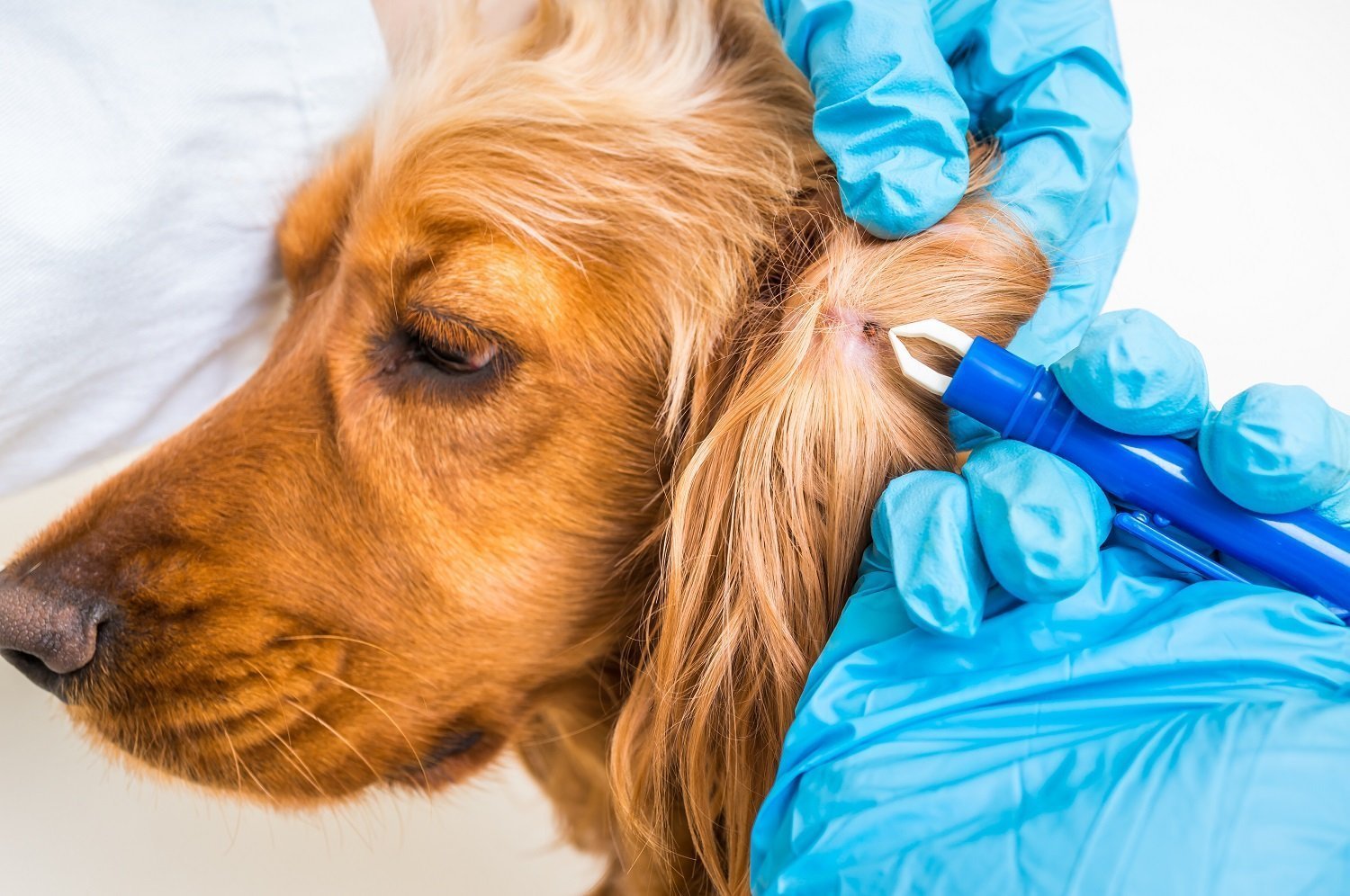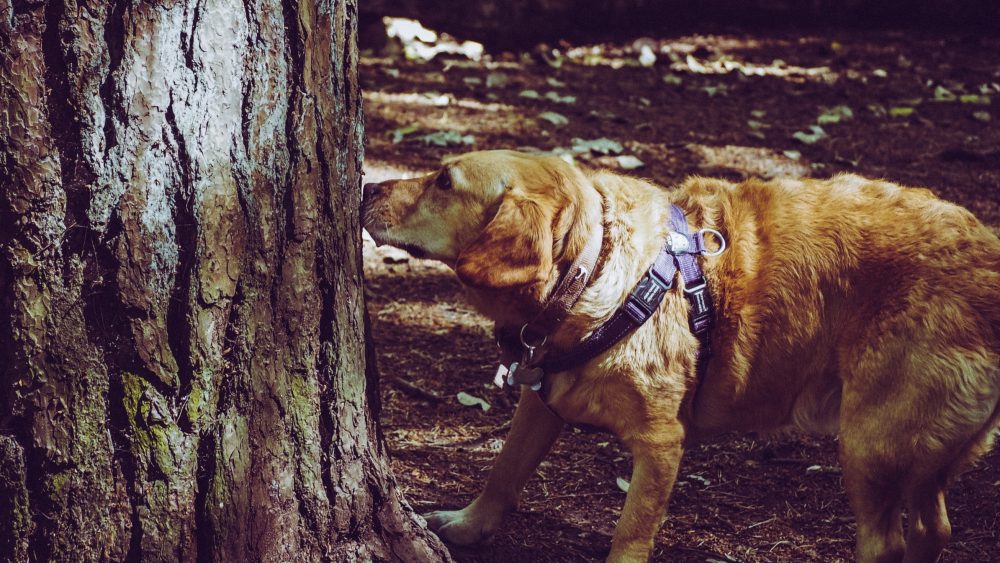This page contains affiliate links. This means that we may get a small commission for recommending products, if you choose to click on something and buy it. This does not cost you anything, but we wanted to be honest and let you know!
(Last Updated On: 6th August 2022)Parasites can infect dogs in any stage of their lives and can cause our furry friends to experience everything from mild discomfort to serious health concerns. These icky pests come in the form of fleas, roundworms, ticks, heartworms, and so much more. Not only can these nuisances harm our beloved family pets, but many of them can be transmitted to people.
In this guide, we’ll take you through parasite prevention 101: Knowledge of common dog parasites, preventative treatments recommendation, and other prevention methods. Start right now and arm yourself with the knowledge to keep parasites away from your dog.
Table of Contents
Product Reviews
Safe-Guard Canine Dewormer for Dogs
Safe-Guard by Excel is a canine dewormer that treats four of the worms discussed in this article: Tapeworms, roundworms, hookworms, and whipworms. Three pouches are included for three days’ worth of treatment. The packages are filled with granules that are easy to mix in with your dog’s normal meals.
You can choose from small, medium, or large size dogs and it is based on your dog’s weight, so be sure to weigh your dog before buying. This treatment must be used for three consecutive days and will be effective for six months.
We strongly recommend using this for your pup who has a mild case of worm infection.
Pros
- Easy to feed granules
- Works for 6 months
- Effective against four common parasites
- Safe for young puppies and pregnant dogs
Types of Dog Parasites
There are three main types of parasites that dogs can get: External, internal, and intestinal. We will cover some of the most common varieties of each, but this will vary according to your region.
External Parasites
External parasites live on mammal’s skin and they feed on their blood, causing the animal to become itchy and uncomfortable. Some external parasites spread disease.
Fleas
Fleas are small insects that leave dogs feeling miserably itchy. Some dogs, especially those with allergies to the fleabites, will chew themselves raw at the bites. Fleas are dark-colored and about the size of a sesame seed. They leave tiny black specks the size of a period in a book throughout your dog’s fur.
Ticks
There are 800 species of ticks worldwide, and each looks different through their four life stages. Ticks are arachnids with eight legs and, when unfed, have hard and flat bodies. They can carry many life-threatening diseases. If your dog goes outside, you should be checking them for ticks at the end of the day.
Internal Parasites
Heartworms
Heartworm larvae are a parasite that is deposited into your dog’s bloodstream from an infected mosquito. As their name suggests, they do infect the heart. More specifically, they mature in the dog’s heart and eventually they clog it which can result in heart failure.
Intestinal Parasites
We will cover intestinal parasites that are worms in this article. Giardia and other non-worm parasites will not be covered in this article, but you should take precautions against those as well. Aside from whipworms, all species of worms below are transmissible to humans.
Tapeworms
Tapeworms are well-known for being flat and ribbon-like in appearance. Dogs typically get them by ingesting fleas, who harbor the tapeworm egg. Tapeworms are unlikely to cause serious disease in your fluffy friend. However, it can cause weight loss which will get worse if you do not catch it and treat the tapeworms. Diarrhea, stomach pain, and itchy anus are other symptoms that dogs may experience. You may see them scoot their rear across the floor more often.
The segments of tapeworms look like grains of rice and you will see them around your dog’s anus or in their stool. Treatment is a medication that you can get from your veterinarian. The best prevention is to keep your pet free from fleas.
Hookworms
Hookworms are less than an inch long, thin worms that are common in dogs. Infection can happen from the environment by ingesting the larvae dropped from another infected dog, insect, or another animal. Dogs will typically lose weight, fail to gain weight, experience a loss of appetite, anemia, and diarrhea.
Your vet will be able to see hookworms in a stool check and treat with medication. Treatment will be repeated to eliminate larvae as they mature. Prevention with regular deworming is recommended if you are in a risky environment.
Roundworms
Roundworms cause the well-known distended belly in puppies from the worms. They absorb the nutrients that a dog eats, resulting in the dog getting fewer and fewer nutrients themselves. Infection is common in puppies since larvae are transmitted during pregnancy and in the mother’s milk. Eggs are also shed in stool.
Symptoms are the typical pot belly, nutrient deficiency, diarrhea, vomiting, and weight loss despite continued appetite. Roundworms can be detected in a stool sample given to a veterinarian.
Medication can be used as a treatment. Multiple treatments may be required to clear out all worms as the larvae mature. You can prevent roundworms with regular deworming treatments.
Whipworms
Whipworms are known and named for their whip-like shape – thin, whip-like front end, and a thick back end. They will attach their body to the wall of the large intestine and feed on blood. A dog will become infected by sniffing or licking the contaminated ground.
Symptoms are not as defined as other worms, and usually, weight loss is the most noticeable. Stool samples sometimes have a mucous covering that owners or veterinarians may notice. Heavy infections may cause diarrhea and anemia, and these infections will leave eggs that are detectable under a microscope during a stool examination.
Dog Parasites Prevention
There are many ways to prevent parasites in your furry family member. We will try to touch on several options to help keep your pet healthy.
External Parasites
Ticks, fleas, mites, and other external parasites are a hassle to get rid of since they are so common in the environment.
Brush Often

Brush your dog often with a flea comb, if it is suitable for their fur type. Otherwise, brush them often enough to keep their fur easy to look through. This will help you peek through their fur to find ticks, mites, fleas, and flea dirt.
Clean Your Yard
Keep your yard clear of debris and long grass where ticks like to hide. This will help keep your pup from bringing them in each time he goes outside, and it will create less worry for you.
Flea and Tick Prevention
Ask your vet about monthly topical flea and tick prevention treatments. There are even collars available through your vet that can prevent fleas and ticks. Some over-the-counter options are not safe for dogs, so be sure to check with your veterinarian before making those purchases.
Internal Parasites
Heartworms spread via mosquitoes, so this will come down to you keeping your dog on a preventative treatment from your veterinarian. There are a number available now, so just talk to your vet about what’s available for you.
Other steps that you can take involve mosquito prevention. Keep standing water off of your property as much as possible. If your city has mosquito prevention spraying, call and see if you can set up something for your neighborhood.
However, nothing will prevent mosquitoes from going to your property. The best bet for heartworm prevention is to get them on a heartworm prevention medicine.
Intestinal Parasites
For puppies, you will want to take them for their first vet check-up where they will be screened for worms and other intestinal parasites amongst other things. For older dogs, there are other things you can do to maintain your pup’s health.
Don’t Let Your Dog Drink Standing Water
Standing water is a breeding ground for many types of parasites, including mosquitoes and giardia. Shared water with other animals is also a great way to spread parasites and other germs. Overall, it is just not a good idea to let your pet drink standing water or share water with unfamiliar animals.
Don’t Let Your Dog Eat Feces
Whether it is their own feces or that of another animal, do not let your dog eat feces. This is how many intestinal parasites are spread. At your own home, you can avoid this by picking up after your pet immediately. When out and about, it is important to keep your pet on a leash or keep a very close eye on your dog when he or she is not on a leash.
Routine Vet Visits
Along with vaccination maintenance and other routine appointments, your vet can do regular screenings or physical checks for intestinal parasites. Your vet can also check your pet’s stool if either of you suspects worms.
Conclusion
Parasite prevention in dogs is important for the health of your whole family. Treating your dog will keep you and others in your family safe from parasites that can transmit to humans and it will keep any other animals in your home safe too. Not only is it good to keep your dog free from fleas and worms, but many of the prevention methods will keep them happier and healthier long term.
Ian is an avid outdoorsman and dog lover. He lives in Central Florida with his wife Heather, and their 2 dogs – Panda (Purebread Rough Collie X English Golden Retriever) & Kuma (Blue Merl Purebread Rough Collie)









